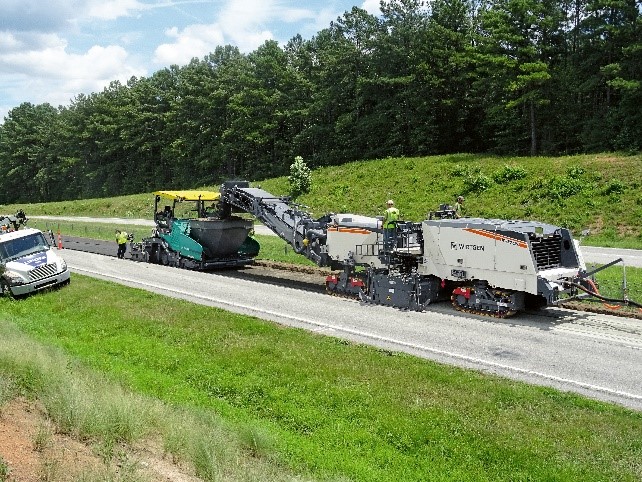
In the United States, a Wirtgen recycling train rehabilitated a highway at a depth of 20 cm in a single pass and without blocking the flow of traffic. In the process, the new W 380 CRi demonstrated its unmatched capabilities.
The four-lane Highway 123 in Pickens County was the scene of the first full-depth reclamation (FDR) operation on the roads maintained by the South Carolina Department of Transportation. Up to 20,000 vehicles a day, 15% of which were trucks, had made structural rehabilitation of the 11 km (7-mile) section of road unavoidable.
Road Widening Included
The construction project was also to be used to simultaneously widen the roadway to 4.40 m (14 feet 5 inches). “To this end, we initially milled off 60 cm (2 feet) along the inner edge of the roadway that borders the passing lane,” said Mike Crenshaw, president of the contractor King Asphalt, Inc. from Liberty, South Carolina, explaining the steps taken to prepare the road using two Wirtgen cold milling machines. Only then could the cold recycling train, led by the W 380 CRi, get rolling. The tracked cold recycler milled the damaged pavement at a width of 3.80 m (12 feet 6 inches) and a depth of 20 cm (8 inches) in a single pass. In the process, it simultaneously granulated the material while mixing in 2.3% foamed bitumen, 1% pre-spread cement, and 3 – 4% water.
Binding Agents Create Permanent Stability
“In FDR, stabilizing the layers recycled with foamed bitumen gives the sub-base the structural strength it needs to withstand recurring loads over decades of use,” explained Mark Stahl, director of recycling products for the Wirtgen Group in North America.
The Perfect Formula
The mix design plays a critical role in this process. This means determining the appropriate amount of binding agent to use. To do so, Wirtgen laboratory equipment – the WLB 10 S laboratory-scale foamed bitumen plant and the WLM 30 laboratory-scale mixer – was used to test six different material samples in advance in order to identify the ideal mix composition for this project. At the end of the structural rehabilitation project, the powerful W 380 CRi had recycled more than 102,000 metric tons (100,000 US tons) of asphalt in an environmentally friendly and high-quality manner using the perfect formula. Mike Crenshaw was delighted with the machine’s output of 427 metric tons (420 US tons) of recycled material per hour: “It worked like a charm. I’ve never seen another machine that can even come close. More than 7 metric tons (7 US tons) rolled over the discharge conveyor every minute.”
Variable Road Rehabilitation beyond the Machine’s Working Width
The W 380 CRi can even rehabilitate road surfaces that exceed the available working widths of 3.20 m (10 feet 6 inches), 3.50 m (11 feet 6 inches), and 3.80 m (12 feet 6 inches). In this case, the recycler scoops up the material on the side that was premilled by a cold milling machine and adds it to the mixing process. Thanks to a mixing capacity of 800 metric t/h (787 US t/h) in combination with rear loading onto a road paver with the appropriate buffer and paving screed, even very wide road surfaces can be rehabilitated in a single pass.
Versatility is Key
Mike Crenshaw also regards the new W 380 CRi’s versatile range of applications as a clear advantage for his company: “It can also be used as a cold milling machine. This is a major advantage. The machine can be fully converted in only two hours.”
More news
- PART 2: CONCRETE IN THE DESIGN OF A UNIQUE LUXURY HOME IN GEORGE, SOUTH AFRICA
- PART 1: CONCRETE IN THE DESIGN OF A UNIQUE LUXURY HOME IN GEORGE, SOUTH AFRICA
- MVULE GARDENS, AFRICA’S LARGEST 3D-PRINTED AFFORDABLE HOUSING PROJECT
- PART 3: HARNESSING THE POTENTIAL OF HIGH SULPHUR FLY ASH IN CONCRETE PRODUCTION
- PART 2: HARNESSING THE POTENTIAL OF HIGH SULPHUR FLY ASH IN CONCRETE PRODUCTION

